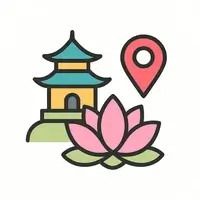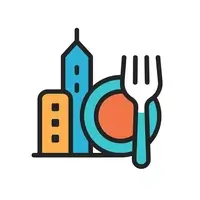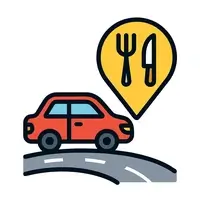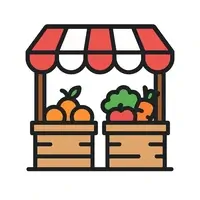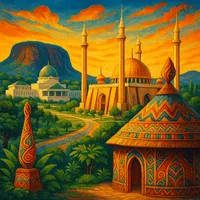
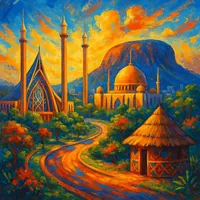
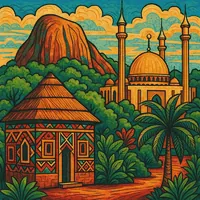
Abuja, Nigeria
Population: 3,770,000
Abuja, Nigeria’s meticulously planned capital, stands out with its iconic Aso Rock, a massive monolith that commands both majestic awe and cultural reverence. Unlike any other city, Abuja artfully fuses modern architecture with the vibrant spirit of Nigerian heritage. This tranquil city is unique in its distinctive grid layout, with the sprawling, lush Millennium Park offering a verdant escape in the heart of urbanity. Abuja's diplomatic pulse is reflected in its array of international embassies, fostering a genuinely global community.













Notable points about Abuja
- Purpose-Built Capital: Abuja stands out as one of the few purpose-built capital cities in the world. Inaugurated in 1991, it was constructed to replace Lagos as Nigeria's capital to help distribute population density and encourage unity due to its central location.
- Architectural Marvels: The city boasts remarkable architecture, including the iconic Nigerian National Mosque and Nigerian National Christian Centre, reflecting the country's diverse religious landscape. A visit to the Aso Rock is also a must for its historical and governmental significance.
- Natural Beauty: Abuja is surrounded by dramatic rock formations like Zuma Rock and lush landscapes, offering picturesque views and numerous hiking opportunities, making it a great retreat for nature enthusiasts and adventurous couples.
- Cultural Diversity: Unlike many Nigerian cities, Abuja is a melting pot of various ethnicities and cultures due to its status as the nation's capital. This diversity is reflected in its vibrant cuisine, arts, and festivals, making it an exciting place for expatriates and culturally curious singles.
- Expat-Friendly: With numerous international schools, top-tier healthcare facilities, and a large expatriate community, Abuja is particularly welcoming to international families and expats seeking a comfortable lifestyle abroad.
- Modern Infrastructure: As a rapidly developing urban center, Abuja offers modern and efficient infrastructure, including wide roads and sophisticated city planning uncommon in most other Nigerian cities, providing convenience to its residents and businesses.
- Economic Opportunities: For entrepreneurs and business-minded individuals, Abuja offers thriving opportunities in sectors like construction, telecommunications, and government contracting, owing to its position as the political and administrative heart of Nigeria.
- Diplomatic Hub: Home to many foreign embassies and diplomatic missions, Abuja is a vital city for international diplomacy and politics, offering a unique hub for those interested in global relations and international law.
- Safety and Security: Generally considered safer and more secure compared to other major Nigerian cities, Abuja appeals to families and the elderly, who can enjoy a calm and peaceful environment with lower crime rates.
- Educational Prospects: The city is home to some of Nigeria's top educational institutions, including the University of Abuja, making it an attractive destination for students seeking higher education and academic excellence.
Summarized Traveller Reviews
Abuja's Neighborhoods
Maitama
🎯 Key Attractions
- Millennium Park: A lush green escape designed by an Italian architect, perfect for slow morning walks.
- Transcorp Hilton Abuja: The city’s high-profile hotel with rooftop views and occasional celebrity sightings.
- Hidden Embassy Café: An unmarked café tucked near diplomatic compounds serving pastries worth the security checks.
✨ Unique Aspects
Impeccably maintained streets, embassies with secret gardens, and some of the city's most discreet fine dining.
Wuse II
🎯 Key Attractions
- Jabi Lake Mall: Retail, cinema, and waterfront views all in one sprawling complex.
- Beer Barn: A lively spot for open-air drinks with the city’s sociable crowd.
- Neon Alley: A backstreet strung with colorful lights, home to underground music gigs.
✨ Unique Aspects
Bustling mix of boutiques, street vendors, and nightlife that feels alive even on a Tuesday.
Asokoro
🎯 Key Attractions
- Aso Rock: The city’s towering granite monolith, looming with quiet authority.
- National Children's Park and Zoo: Family-friendly with a hint of faded charm.
- Secret Mango Grove: A grove where locals swear the fruit tastes sweeter than anywhere else.
✨ Unique Aspects
Home to top government officials, lush hidden gardens, and sudden sweeping views of the city.
Garki
🎯 Key Attractions
- Garki International Market: A lively maze of stalls selling everything from fabric to phone chargers.
- Area 1 Shopping Complex: Mid-century retail center that hasn’t lost its soul to glass facades.
- Tailor’s Corner: A cluster of skilled tailors who can turn Ankara fabric into wearable art in a day.
✨ Unique Aspects
A lived-in, authentic slice of the city where locals outnumber visitors ten to one.
Jabi
🎯 Key Attractions
- Jabi Lake: A calm stretch of water ideal for sunset strolls or a kayak paddle.
- Jabi Boat Club: A lakeside hangout offering boat rides and weekend barbecues.
- Floating Bookshop: A converted boat selling second-hand novels and coffee on deck.
✨ Unique Aspects
One of the few spots where Abuja slows down enough for you to notice the clouds.
Utako
🎯 Key Attractions
- Utako Market: An energetic market where traders sell produce, spices, and street snacks.
- Bus Terminal: Gateway for intercity travel and people-watching at its finest.
- Midnight Suya Strip: A row of late-night grills serving spicy beef skewers until dawn.
✨ Unique Aspects
Equal parts departure point and destination, fueled by the scent of roasting meat.
Gwarinpa
🎯 Key Attractions
- Gwarinpa Central Park: Green space where residents gather for exercise and weekend fairs.
- Mega Plaza: Shopping and dining under one high-ceilinged roof.
- Block 4 BBQ Pit: An informal weekend meet-up spot for smoky grilled fish.
✨ Unique Aspects
So vast it has its own micro-economy—some residents rarely leave.
Lokogoma
🎯 Key Attractions
- Lokogoma Fresh Market: New but thriving spot for fresh produce and artisanal bread.
- Community Football Pitch: Lively games every weekend draw both players and spectators.
- Painted Wall Lane: A short street where local artists turn fences into evolving murals.
✨ Unique Aspects
Feels like watching a neighborhood being born in real time.
Kubwa
🎯 Key Attractions
- Kubwa Market: Packed stalls selling everything from yams to mobile phones.
- Train Station: Connecting Kubwa to central Abuja and beyond.
- Roof Drum Nights: Spontaneous evening drum circles on neighborhood rooftops.
✨ Unique Aspects
Feels like a small town but moves at a big city pace.
Lugbe
🎯 Key Attractions
- Lugbe Market: Open-air market with a focus on affordable produce and home goods.
- Airport Road Cafés: Cluster of roadside cafés perfect for layover coffee.
- Runway View Hill: Small hill where locals watch planes take off against the sunset.
✨ Unique Aspects
The kind of place you pass through until you realize it’s quietly pulling in new residents.
Durumi
🎯 Key Attractions
- National Stadium: The heart of sports and big events in Abuja.
- Cultural Village: A hub for craft fairs, art shows, and heritage festivals.
- The Green Stage: An outdoor music space lit entirely by solar lanterns.
✨ Unique Aspects
One of the few places where sport, art, and activism comfortably mingle.
Central Business District
🎯 Key Attractions
- National Mosque: Golden-domed landmark visible for miles.
- National Christian Centre: Striking modernist cathedral with sweeping arches.
- Lunch Line Alley: Hidden lane where bankers and bike messengers queue for the same jollof rice.
✨ Unique Aspects
Where the country’s decisions are made over both boardroom tables and street food.














